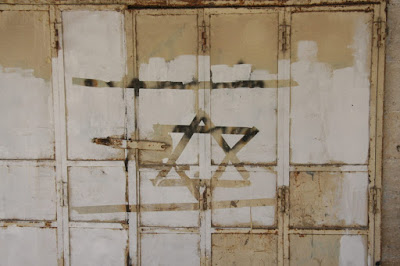Long past time to reclaim Judaism from Zionism
 |
| Carolyn L. Karcher – June 7, 2019 |
“Do you think Judaism will ever recover from having been hijacked by Zionism?” a friend recently asked me.
I have wrestled with a similar question for many years: how can the ethical precepts of Judaism—pursue justice, love your neighbor, love the stranger, repair the world—be reconciled with Zionism? Any Judaism I can believe in is at odds with this nationalist ideology, which claims that only a state controlled by Jews and privileging them over non-Jews can protect them against anti-Semitism and the threat of another Holocaust.
I did not always realize this. When I was growing up in Tokyo, Japan, in the 1950s, I thought Judaism consisted only of rituals performed with Hebrew prayers and allegiance to the newly established state of Israel. Our small Jewish community, made up mainly of Ashkenazi emigres from Siberia like my father’s family and of Sephardi emigres from Syria and Lebanon, together with Israeli Embassy staff and American businesspeople, did not have a rabbi.
Perhaps that is why, instead of Judaism’s key ethical tenets, our Sunday School class was taught the story of Israel’s heroic founding, as recounted in Leon Uris’s novel “Exodus.” No wonder I confused Zionism with Judaism, mistaking a political ideology of Jewish nationalism born in the late nineteenth century for an ancient religion rooted in the Torah and the Talmud.
Not until Israel’s 1982 invasion of Lebanon did I begin to question my idealized image of Israel and, ultimately, the premise of Zionism. Israel’s indiscriminate bombing of Beirut, shelling of hospitals, and collusion with Lebanese Phalangist militias in massacres at the Sabra and Shatila refugee camps shook me to the core.
Struggling to digest these atrocities, I went to a teach-in. The main speaker contrasted Israel’s boasts of “making the desert bloom” with its destruction of thousands of Palestinian homes and olive trees. My stomach in knots, I recoiled from her message. Only when I learned that she was not Palestinian but an Israeli Jewish human rights lawyer could I let her words penetrate my consciousness.
Back then, disputing Zionism felt very scary. It certainly isolated me from friends and family. I did not know that at the start of the Zionist movement, most Jews worldwide had opposed it. Even throughout World War II, Jewish opponents of Zionism continued to hold up an alternative vision for Palestine of a secular democratic state in which all citizens would enjoy equal rights. In 1947, they demanded freedom for the region’s “entire population” and a guarantee of “the national rights of both communities,” Jewish and Arab.
Although by 1948 the Holocaust convinced a majority that a Jewish state offered the best protection for Jews, Israel’s decades of ethnic cleansing and unending warfare—and Palestinians’ tenacious resistance—have since led me to understand that a Jewish state was a false solution to the quest for safety.
Over the years, I met more and more Jews who were questioning Zionist ideology. In 2016, the idea occurred to me of collecting their stories so others contending with the same doubts could know they were not alone. I designed the collection as a vehicle for initiating difficult conversations within Jewish families and communities, through stories with which readers could identify.
I began with a handful of acquaintances. Then I solicited narratives from people who told personal stories at public events, or wrote insightful op-eds, articles, or letters to the editor. I found more contributors when those I recruited spread the word through their networks.
To ensure that the collection reflected diverse backgrounds and perspectives, I made special efforts to seek out Sephardi/Mizrahi as well as Ashkenazi Jewish contributors. And in view of the leading role that college-age Jews are playing in the Palestine solidarity movement, I worked hard to enlist them. I ended up with forty fresh and deeply personal accounts. This year, the book came to fruition, under the title Reclaiming Judaism from Zionism: Stories of Personal Transformation.
The collection defies the stereotype of Jews who reject Zionism as “self-hating.” On the contrary, it reveals that many remain religious and observant, while others take pride in a secular Jewish identity intertwined with their progressive ideals. The authors include rabbis, historians of Jewish Studies and Middle Eastern Studies, other academics, lawyers, social workers, journalists and media professionals, activists, and recent graduates. Whether religious or secular, they have come to see Zionism as violating Judaism’s most sacred ethical principles.
The Torah commands Jews: “The stranger that sojourneth with you shall be unto you as the home-born among you, and thou shalt love him as thyself; for ye were strangers in the land of Egypt” (Lev. 19:34). Zionist ideology instead teaches Jews to treat Palestinians as strangers in their own land, enemies who must be expelled.
It is long past time to reclaim Judaism from Zionism, long past time for all who value the ethics of Judaism—or of simple humanity—to repudiate any ideology that denies Palestinians equality, freedom, and dignity.


